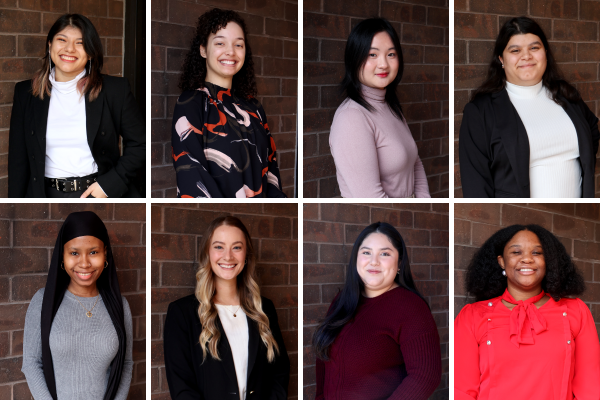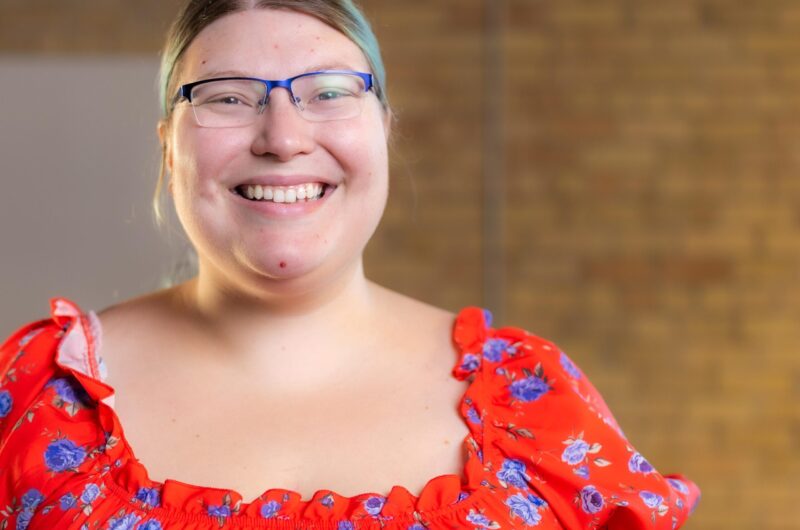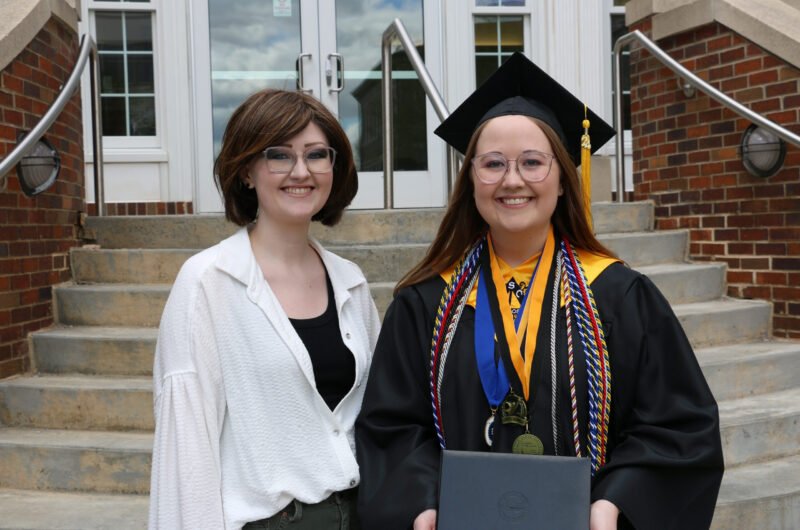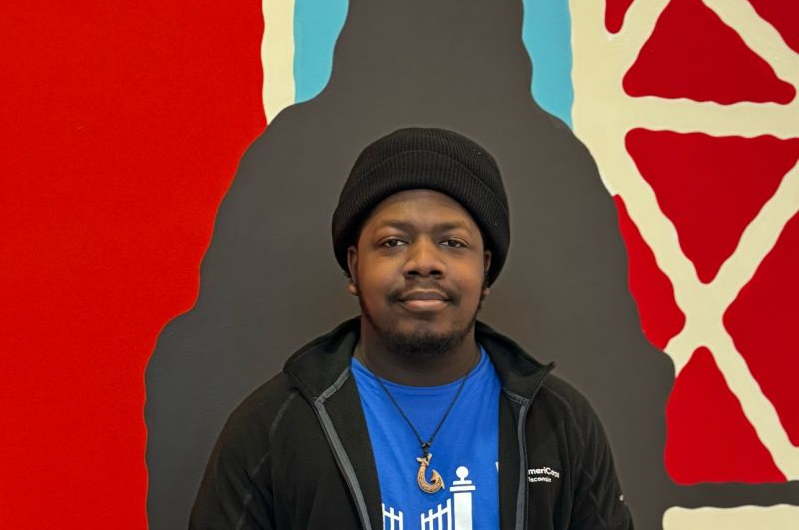At College Possible Omaha, a powerful outcome of giving back is transforming lives. Out of the 17 coaches currently serving in Omaha, eight were once students who benefited from the program’s guidance and support in previous years. These student alumni have returned as AmeriCorps coaches to steer the next generation toward academic success. Their personal experiences and deep connections to the program uniquely equip them to inspire and support students.
Motivations for returning to College Possible
While each coach has their own reasons for choosing to serve with College Possible, the alumni members share a common motivation: giving back to the program and serving students just as their coaches served them. College access coach Dorothy, who is currently serving her second year and plans to serve for a third, explains, “The program has had a very important role in my life. I knew that the experience of going through the program had given me valuable knowledge that I could bring into a coaching role. The education and experience I gained as a college student made returning as a coach and serving students the best next step for me after college.”
College success coach Katie, who taught in Thailand and Spain following her college graduation, found herself at a crossroads and wasn’t sure what the next step in her career would be. She saw service with College Possible as a unique opportunity to learn more about the higher education landscape and make a meaningful impact. “It offered me a chance to explore the higher education system while giving back to a program that had greatly influenced my own journey.”
Several coaches cited the profound impact their own coaches had on their lives as a defining reason for their return to College Possible. College success coach Fatuma recalls her high school coach, Mallory, who guided her though ACT prep and scholarship applications. “I attribute my success and my being awarded the Buffett Scholarship to my involvement in College Possible, and Mallory as my coach,” she shares. Inspired by the difference their coaches made, many alumni return to be that same catalyst for success in students’ lives.
For others, the decision to return had familial roots. Coaches like Yuli and Liz, both former College Possible students, were influenced by family members who had previously served. When Yuli was offered the opportunity to be a coach, she consulted her sister, a former coach, who had always spoken highly of her experiences. “My sister still talks about the students she served to this day,” Yuli shares. Similarly, Liz, Yuli’s cousin, decided that following in her cousin’s footsteps was the best next step. This sense of family and community within the program reinforces their commitment to giving back.
When success coach Rhea was a student in the College Possible program, her coach often shared stories about her own experiences serving as a coach and how deeply fulfilling it was. “My coach’s stories about the students she helped inspired me to become that source of support for someone else,” Rhea shares. “I wanted to come back to the program to gain a new perspective as a coach rather than a student. I wanted to experience that fulfillment.”
When considering their options after college graduation, many coaches were also influenced by a personalized letter from Jasmine McCain, Omaha’s AmeriCorps recruitment and training manager. In these letters, Jasmine tailored the content to draw connections between their college majors and potential career paths, highlighting opportunities to gain experience in areas like data management, one-on-one student interactions, and Salesforce reporting. This personal touch to recruitment played a significant role in encouraging several former College Possible students to return as coaches.
Turning experience into practice
One significant skill that many coaches now feel well equipped with is their ability to relate to the students they serve. Having once been in their shoes and gone through the program themselves, many of our coaches feel they can better empathize with and support current students.
Katie believes that her experience as a College Possible student has profoundly influenced her coaching style. “I often see myself in the students I serve and how they want to have everything perfectly planned out, but sometimes life just doesn’t work that way. I had to learn that on my own. When students come to me with a problem, I try to help them work through whatever challenges they’re facing rather than trying to just fix it for them.” Katie also shares advice that stuck with her from her own coach, “My coach always challenged me to explore if what I was doing was really making me happy, or if I was just going through the motions of a particular challenge. I’ve carried that with me and now push students to do more and to do what makes them happy, like how my coach did for me.”
Reflecting on advice from her own coach, Sophia encourages the college students she serves to ask for help when they need it. She shares, “I treat students as equals in conversations so they feel more comfortable when speaking to an authority figure.” Sophia approaches all student interactions with empathy and open listening, ensuring students feel heard and cared for.
Similarly, Fatuma has leveraged her experience as a College Possible student to empower those she serves to advocate for themselves and seek help when they need it. “As someone who benefited greatly from the support and encouragement of my College Possible coaches, I want to instill that same sense of self-advocacy and resourcefulness in the next generation of students,” Fatuma says. “I want them to understand that asking for help is a strength, not a weakness. I hope to inspire them to take charge of their own paths and reach out whenever they need support.”
Success coach Say also draws on her personal experience when providing coaching and support. “I know college can be tough, so I try to be more flexible with students while still encouraging them to try their best. One of my coaches always told me that it doesn’t hurt to try, and you’ll never know what can happen unless you try.”
Dorothy draws on her experience as a College Possible student to provide examples when coaching students and structuring lesson plans. One initiative she has taken is to physically track students’ college and scholarship applications. In her office, she keeps a poster board with all student names and stickers for each college and scholarship application completed. At the end of the school year, she rewards those with the highest number of applications by recognizing them and their hard work. Dorothy shares, “As a high school student, my coach went above and beyond to motivate us in many ways, such as keeping track of our college and scholarship applications and rewarding us for meeting goals. I will always remember my coach’s support and encouragement throughout my journey to college.”
Rhea’s approach to coaching is characterized by deep empathy and understanding. She makes it a point to let students know that she is there for them and that she is not someone to be intimidated by. “I remember feeling so lost and overwhelmed during my own college journey,” Rhea says. “I want the students I serve to feel a sense of security and trust. Whether it’s personal or academic issues, I make sure to listen to their needs and help them navigate their challenges with compassion.”
These stories of alumni returning to College Possible as AmeriCorps coaches underscore a larger narrative of reciprocity and dedication within the program. Their willingness to come back and mentor the next generation speaks volumes about the program’s enduring influence and the strength of the community it fosters. The cycle of giving back, rooted in personal experience and genuine care, continues to transform lives and pave the way for future success.
By returning to College Possible, these alumni not only pay forward the support they received but also bring a unique perspective and dedication that deeply resonates with the current students they now mentor. Their journeys and motivations highlight the program’s lasting impact and the enduring cycle of giving back.



